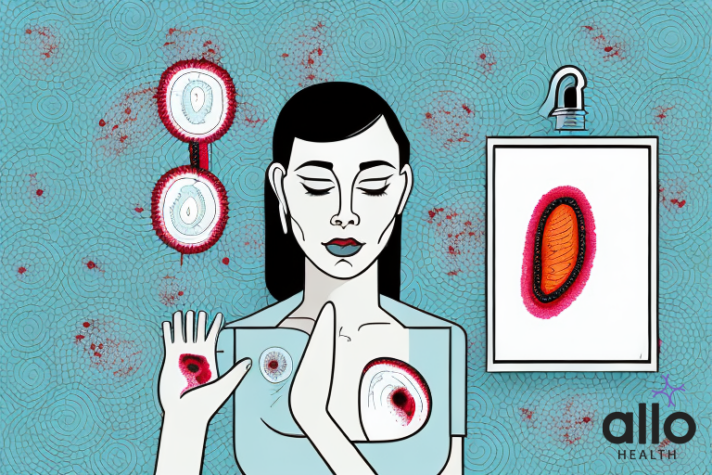Vaginal Bleeding After Bowel Movement

Allo Health is dedicated to personalized well-being, offering support and trusted information tailored to individual health goals. The platform emphasizes human-generated content, led by a distinguished medical team of experts, including physicians and sexual health specialists. Their commitment to credibility involves rigorous fact-checking, authoritative research, and continuous updates to ensure accurate, up-to-date information. Allo Health's unique approach goes beyond conventional platforms, providing expert-led insights and a continuous commitment to excellence, with user feedback playing a crucial role in shaping the platform's authoritative voice.

Ms Ashima Sahore has a masters in Clinical Psychology and has been working avidly in the space of therapy and research for the past 2 years. Her expertise lies in areas of stress, depression, anxiety, improving self-esteem, confidence, body appreciation among many others. She imbibes a wholesome approach to therapy and provides a non-judgemental, LGBTQAI+, and safe space.
Why This Was Upated?
Our experts continually monitor the health and wellness space, and we update our articles when new information became available.
Updated on 06 September, 2023
- Article was updated as part of our commitment to diversity, equity, and inclusion.

"The following blog article provides general information and insights on various topics. However, it is important to note that the information presented is not intended as professional advice in any specific field or area. The content of this blog is for general educational and informational purposes only.
Book consultation
The content should not be interpreted as endorsement, recommendation, or guarantee of any product, service, or information mentioned. Readers are solely responsible for the decisions and actions they take based on the information provided in this blog. It is essential to exercise individual judgment, critical thinking, and personal responsibility when applying or implementing any information or suggestions discussed in the blog."
Vaginal bleeding after bowel movements is a common concern faced by women. It can be a concerning symptom that may indicate an underlying health issue or medical condition.
Causes Of Vaginal Bleeding After Bowel Movements
- Haemorrhoids: Hemorrhoids are swollen blood vessels in the rectum or anus that can bleed during bowel movements. They are a common cause of rectal bleeding and may sometimes be associated with vaginal bleeding, especially if the haemorrhoid is located near the vaginal opening.
- Anal Fissures: An anal fissure is a small tear or cracks in the lining of the anus. Passing hard or large stools can cause or worsen fissures, leading to rectal bleeding, and in some cases, it might be mistaken for vaginal bleeding.
- Infections: Infections in the vagina or cervix can cause bleeding, which may be noticed after bowel movements due to the pressure exerted on the pelvic area during straining.
- Cervical Polyps: Cervical polyps are benign growths on the cervix that may bleed, especially when irritated, such as during bowel movements.
- Uterine Conditions: Certain conditions affecting the uterus, such as endometrial polyps, uterine fibroids, or even endometrial cancer, may cause vaginal bleeding, which might be noticed after bowel movements due to the proximity of the rectum to the uterus.
- Vaginal Trauma: Any trauma or injury to the vaginal area could result in bleeding, and bowel movements might exacerbate the condition.
- Sexual Intercourse: Sometimes, intercourse can cause minor vaginal bleeding, which may be noticed after bowel movements.
- Gynaecological Procedures: Recent gynaecological procedures, such as biopsies or cervical exams, can cause bleeding that persists for a short period.
- Hormonal Imbalances: Fluctuations in hormone levels, especially during menopause, can lead to changes in the uterine lining and cause bleeding.
- Cancer: Though rare, certain cancers, such as cervical or vaginal cancer, can present with vaginal bleeding as a symptom.
We encourage you to not ignore vaginal bleeding, especially if it occurs after bowel movements. If you experience this symptom, you should reach out to a healthcare professional for a proper evaluation and diagnosis. They may perform a physical examination, take your medical history, and possibly order additional tests to identify the underlying cause of the bleeding. Prompt medical attention is crucial to determine the appropriate treatment and ensure your overall well-being.
Symptoms Of Vaginal Bleeding After Bowel Movements
Vaginal bleeding after bowel movements can present with a variety of symptoms, depending on the underlying cause. Some of the possible symptoms associated with this condition include:
- Vaginal Bleeding: This is the primary symptom of concern. After passing a bowel movement, you may notice blood in your underwear or when you wipe. The amount of bleeding can vary from light spotting to more significant amounts of blood.
- Pain or Discomfort: You may experience pain or discomfort in the anal or vaginal area. This could be due to conditions such as haemorrhoids, anal fissures, or infections, which can cause irritation and inflammation.
- Itching or Irritation: Irritation and itching around the anus or vaginal opening may be present, especially if the bleeding is caused by haemorrhoids or infections.
- Changes in Bowel Movements: You might notice changes in your bowel habits, such as constipation or diarrhoea, which can sometimes accompany conditions like haemorrhoids or gastrointestinal concerns.
- Abdominal Pain: Some conditions causing vaginal bleeding after bowel movements, such as uterine fibroids or endometriosis, may lead to abdominal pain or discomfort.
- Vaginal Discharge: Infections of the reproductive organs can cause abnormal vaginal discharge, which may be accompanied by bleeding.
- Painful Intercourse: If the vaginal bleeding is related to an infection or an underlying uterine condition, you may experience pain during sexual intercourse.
- Fever and Chills: Infections, particularly those caused by sexually transmitted infections (STIs), may be associated with fever and chills in some cases.
- Foul Odor: Infections in the vaginal area can sometimes cause a foul-smelling vaginal discharge.
Treatment Of Vaginal Bleeding After Bowel Movements
- Haemorrhoids: If haemorrhoids are causing the bleeding, treatment options may include:
- Over-the-counter creams or ointments to reduce inflammation and pain.
- Stool softeners or fibre supplements prevent constipation and straining during bowel movements.
- Warm sitz baths to soothe the area and promote healing.
- In severe cases, minimally invasive procedures, such as rubber band ligation or sclerotherapy, shrink or remove the haemorrhoids.
- Anal Fissures: Treatments for anal fissures may involve:
- Over-the-counter creams contain topical anaesthetics to relieve pain and promote healing.
- Stool softeners or fibre supplements prevent constipation and reduce strain during bowel movements.
- Sitz baths help with pain relief and healing.
- In some cases, medications relax the anal sphincter and promote healing.
- If conservative measures fail, surgical intervention may be considered.
- Infections: Treatment for infections in the vaginal or reproductive area will depend on the specific causative organism. It may involve:
- Antibiotics to treat bacterial infections.
- Antifungal medications for yeast infections.
- Antiviral medications for certain viral infections.
- It’s essential to complete the full course of treatment as prescribed by the healthcare professional.
- Uterine Conditions: If the bleeding is related to uterine concerns, treatment options might include:
- Hormonal therapy to regulate menstrual cycles and manage conditions like fibroids or endometriosis.
- Nonsteroidal anti-inflammatory drugs (NSAIDs) to alleviate pain and inflammation.
- Surgical procedures to remove fibroids or polyps, or to treat severe cases of endometriosis.
- Gastrointestinal concerns: If rectal bleeding is the primary concern and causing vaginal bleeding due to close proximity, treatment may involve:
- Addressing the underlying gastrointestinal concern through lifestyle changes, medications, or surgery, depending on the specific condition.
- Managing constipation or diarrhoea through dietary modifications and medications.
- Preventing straining during bowel movements through stool softeners or lifestyle changes.
Prevention Of Vaginal Bleeding After Bowel Movements
Preventing vaginal bleeding after bowel movements involves addressing the underlying causes that may lead to this symptom. Here are some general tips that may help reduce the risk of experiencing vaginal bleeding after bowel movements:
- Maintain Good Bowel Habits:
- Consume a high-fibre diet: Eating plenty of fruits, vegetables, whole grains, and legumes can help prevent constipation and reduce the need for straining during bowel movements.
- Stay hydrated: Drinking an adequate amount of water can help soften stools and make bowel movements more comfortable.
- Avoid holding in bowel movements: Respond to the urge to have a bowel movement promptly to avoid constipation and strain.
- Practice Proper Hygiene:
- After bowel movements, use gentle, unscented wipes or plain water to clean the anal area. Avoid harsh or scented soaps, as they can irritate the skin.
- Pat the anal area dry with a soft, clean towel. Avoid rubbing, as it can further irritate the area.
- Exercise Regularly:
- Engage in regular physical activity, as exercise can help promote regular bowel movements and reduce the risk of constipation.
- Avoid Straining During Bowel Movements:
- If you experience difficulty passing stools, consider using stool softeners or fibre supplements as recommended by a healthcare professional.
- Avoid spending extended periods of time on the toilet, as it can lead to additional strain.
- Practice Safe Sex:
- Use barrier protection, such as condoms, during sexual intercourse to reduce the risk of sexually transmitted infections (STIs) that could cause vaginal bleeding.
- Maintain Good Genital Hygiene:
- Keep the vaginal area clean and dry to prevent infections that could lead to vaginal bleeding.
- Attend Regular Check-ups:
- Regular gynaecological check-ups are essential for the early detection and management of any vaginal or reproductive concerns.
- Address Underlying Health Conditions:
- If you have a history of haemorrhoids, anal fissures, gastrointestinal concerns, or uterine conditions, follow your healthcare professional’s recommendations for management and treatment.
- Minimize Straining During Pregnancy:
- Pregnant women should pay extra attention to preventing constipation and straining, as they are more susceptible to vaginal bleeding due to increased pressure on the pelvic area.
These prevention tips are general in nature, and the best approach to preventing vaginal bleeding after bowel movements will depend on the individual’s specific health situation. If you experience vaginal bleeding after bowel movements or have concerns about your health, it’s essential to consult a healthcare professional for a proper evaluation and personalized advice.
Complications Of Vaginal Bleeding After Bowel Movements
Vaginal bleeding after bowel movements can be a concerning symptom, and if left untreated or ignored, it may lead to various complications. The severity of the complications can vary depending on the underlying cause of the bleeding. Here are some potential complications associated with this symptom:
- Anaemia: If the vaginal bleeding is persistent and significant, it can lead to iron deficiency anaemia, a condition in which the body lacks enough healthy red blood cells to carry sufficient oxygen to the tissues. Anaemia can cause fatigue, weakness, dizziness, and other symptoms.
- Infection Spread: If the bleeding is due to an infection, such as a sexually transmitted infection (STI), and it remains untreated, the infection may spread to other parts of the reproductive system, leading to more severe complications.
- Chronic Pain and Discomfort: Conditions like anal fissures, haemorrhoids, or uterine concerns can cause chronic pain and discomfort in the anal and vaginal areas, affecting the quality of life and daily activities.
- Reduced Quality of Life: Frequent bleeding episodes and associated symptoms can lead to reduced quality of life, affecting physical, emotional, and social well-being.
- Progression of Underlying Conditions: If the bleeding is a symptom of an underlying health condition, such as uterine fibroids, endometriosis, or gastrointestinal concerns, delaying treatment may allow these conditions to progress and worsen over time.
- Infertility and Pregnancy Complications: Some underlying conditions causing vaginal bleeding after bowel movements can affect fertility or lead to complications during pregnancy.
- Psychological Impact: Frequent or severe vaginal bleeding can lead to anxiety, stress, and emotional distress, especially when the cause is not immediately apparent or has not been properly diagnosed.
- Hemorrhagic Shock (rare): In highly severe cases of uncontrolled bleeding, there is a risk of hemorrhagic shock, a life-threatening condition in which the body loses significant amounts of blood, leading to organ failure.
Frequently Asked Questions
(1) Is it normal to experience vaginal bleeding after bowel movements during pregnancy?
Vaginal bleeding during pregnancy is not considered normal and should be promptly evaluated by a healthcare professional as it may indicate underlying concerns that require attention.
(2) What should I do if I notice vaginal bleeding after bowel movements?
If you experience vaginal bleeding after bowel movements, it’s essential to seek medical attention for proper evaluation and diagnosis to determine the underlying cause and receive appropriate treatment.
(3) Can constipation cause vaginal bleeding after bowel movements?
Yes, constipation can lead to straining during bowel movements, which may cause irritation and bleeding from conditions like haemorrhoids or anal fissures, potentially leading to vaginal bleeding.
(4) Are there any home remedies to alleviate vaginal bleeding after bowel movements?
While home remedies may temporarily relieve some causes, such as sitz baths or topical creams for haemorrhoids, it’s crucial to consult a healthcare professional for a comprehensive diagnosis and proper treatment.
(5) Can infections in the reproductive organs cause vaginal bleeding after bowel movements?
Yes, infections in the vaginal or reproductive area, such as vaginitis or cervicitis, may lead to vaginal bleeding, especially if aggravated by straining during bowel movements.
(6) What are the potential complications of vaginal bleeding after bowel movements?
Untreated vaginal bleeding can lead to complications like anaemia, infection spread, chronic pain, fertility concerns, pregnancy complications, psychological distress, and, in rare cases, hemorrhagic shock.
(7) Is vaginal bleeding after bowel movements always serious?
While some cases may be due to minor concerns like haemorrhoids, it’s crucial to get it evaluated by a healthcare professional as it could also indicate underlying conditions requiring medical attention.
(8) Can stress or anxiety cause vaginal bleeding after bowel movements?
Stress or anxiety alone may not directly cause vaginal bleeding after bowel movements. Stress can exacerbate underlying health conditions that might contribute to this symptom.
(9) How can I prevent vaginal bleeding after bowel movements?
Preventive measures include maintaining good bowel habits, practising proper hygiene, exercising regularly, using barrier protection during sex, attending regular check-ups, and addressing underlying health conditions promptly. Always consult a healthcare professional for personalized advice.





































